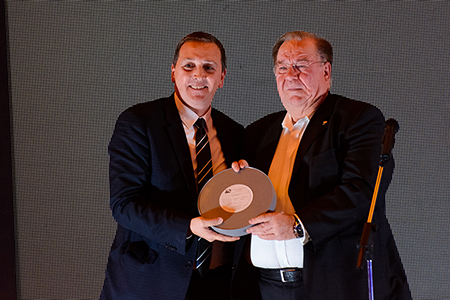Classic Georgian films return to country in historic deal

The first batch of film tapes representing Georgia's cinematic heritage are now back in the country following a deal with Russia that will see hundreds of 20th Century films from archives in Russia be returned home.
The films will be stored in modern repositories in Georgia's capital Tbilisi.
On Thursday four classic films made in the Soviet era in Georgia were symbolically returned home within a special ceremony in the capital city.
At the celebratory occasion, hosted at Tbilisi's Biltmore Hotel, Minister of Culture and Monument Protection of Georgia Mikheil Giorgadze received copies of 80-year-old original film tapes from Russia's National Film Foundation General Director Nikolay Borodachev.

Georgia's Minister of Culture and Monument Protection Mikheil Giorgadze speaks at the special ceremony. Photo from the Ministry of Culture and Monument Protection of Georgia's press office.
Minister Giorgadze formally signed a deal with Borodachev in September to returned the films made in Georgia to their homeland.
Yesterday's ceremony marked the handover of films from the year 1928 including The Last Hour by director Mikheil Chiaureli and Holtze by Leonard Esakia, as well as the latter's 1930 work Amerikanka and a documentary piece named Buba by Georgia's first female director Nutsa Ghoghoberidze.
The launch of the anticipated handover process was announced by Georgia's Special Envoy to Russia Zurab Abashidze last month.
The complete deal involved hundreds of Georgian films created over seven decades of Soviet rule in Georgia from 1921-1991. The films were currently being stored at the Russian foundation, also known as Gosfilmofond.
In addition to the symbolic significance of returning the cinema heritage to Georgia, the transfer of film tapes was important as they represented the original material used in production, meaning they can be converted by experts to any modern multimedia format and preserved digitally in Georgia.
The physical tapes will also be stored in Georgia. The Government was now working to create a modern film archive equipped with modern technologies and all other means to keep the historic film rolls in top condition.
The idea to establish a film archive was part of a recent project where experts from the Georgian National Film Centre retrieved unique historical film tapes from public and personal archives in Tbilisi.
Meanwhile the entire process of moving the Georgian film collection from the Gosfilmofond archive to Georgia was expected to take seven years, said Georgia's Ministry of Culture and Monument Protection.
Gosfilmofond houses one of three largest cinema archives in the world and is home to around 70,000 original films including about 1,000 Georgian productions created by the Soviet-era Georgian Film studio.
Georgian cinematographers first called for the return of film tapes following the collapse of the Soviet Union in 1991 but the process did not see significant progress until recently.
 Tweet
Tweet  Share
Share